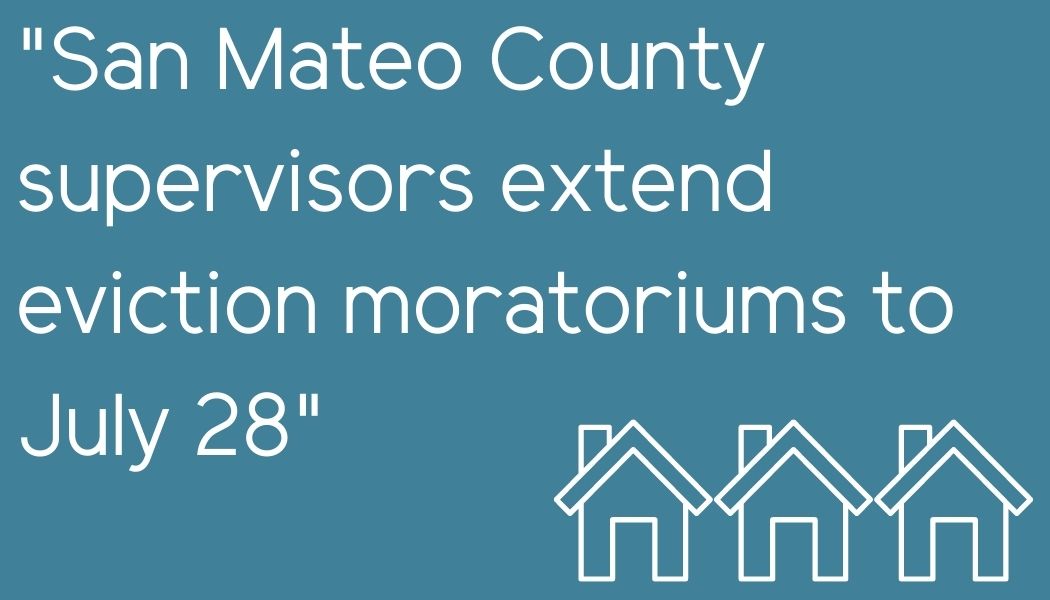San Mateo County supervisors extend eviction moratoriums to July 28
Renter advocates push for additional protections for households struggling with rent during pandemic
June 26, 2020
With unemployment looming at more than five times its usual rate, and many residents feeling anxiety about paying rent, the San Mateo County Board of Supervisors voted Tuesday to further extend moratoriums on residential evictions throughout the county and on commercial evictions in unincorporated county areas until July 28.
Governor Newsom signed an executive order at the end of May authorizing local jurisdictions to extend eviction moratoriums through that date.
Under the ordinance, renters whose ability to pay rent has been impacted by the COVID-19 pandemic are required to notify their landlord within 14 days of receiving an emergency regulation notice – which landlords are required to provide to their tenants. Renters are liable for unpaid rent within 180 days after the emergency ordinance ends.
Courts have suspended eviction proceedings for the time being as well.
In public comments, a number of local residents and leaders expressed concerns that the extension did not go far enough.
They asked the county supervisors to consider extending the repayment period for tenants beyond 180 days, or converting their debt to civil debt.
Renters, said Nazanin Salehi, an attorney with Community Legal Services in East Palo Alto, are "not just willy-nilly choosing not to pay their rent," she said. They must demonstrate they cannot pay rent to be eligible for the protections offered in the ordinance.
They are unable to pay rent through no fault of their own, and will be vulnerable to evictions once they are allowed to proceed again without sufficient time to make up for back rent in a troubled economy.
"You cannot draw blood from a stone," she said.
In a May letter from the nonprofit legal services provider again urging the Supervisors to not just extend the eviction moratorium but provide renters additional protections during the pandemic, the nonprofit stated, "Tenants will be forced to pay their future rents on time or face eviction, to simultaneously make payments toward the balloon payments of rent debt that have been accruing, and to pay for other necessities like food, healthcare, and utilities. Such obligations will place extreme financial hardships on vulnerable families during a time where future job and income stability is all but certain."
The nonprofit added that measures to convert rent debts to civil debts have been adopted by other Bay Area jurisdictions, like Alameda and Solano counties and the cities of Berkeley and Oakland.
Doing so requires tenants to pay the rents they have agreed to, but eliminates the danger of losing their homes if they are unable to pay the rent back within 90 to 180 days after the eviction moratorium expires.
Landlords, rather than follow the traditional eviction process by filing action for an unlawful detainer, would pursue unpaid rent debts through small claims actions, civil actions, collections actions, or negotiated payment plans, according to the nonprofit.
A health care provider at the Fair Oaks Health Center in North Fair Oaks said she has seen people experiencing high levels of anxiety related to the fear of becoming homeless and urged the supervisors to do what they can to reduce those anxieties and extend the rent moratorium for vulnerable residents.
In the years before the COVID-19 pandemic, San Mateo County's unemployment rate hovered around 2%, routinely one of the lowest unemployment rates in the state.
That number has more than quintupled from 2.1% in January to 11.1% of the labor force in May, according to statistics from the state Employment Development Department.
And even before the pandemic, more than 20% of Black renter households and about 25% of Hispanic and Latino renter households within the county spent 50% or more of their income on rent, according to a 2018 study by the Housing Leadership Council of San Mateo.
Others, such as representatives from landlord groups, opposed extending the ordinance beyond the time frame the Governor has authorized, arguing that some small-business property owners are concerned about paying property taxes or mortgages without rent revenues coming in.
Rhovy Lyn Antonio of the California Apartment Association said she sought to ensure that homeowners and property owners receive payment for back rent in a "manner equal to both sides."
Access the county's web page on help for commercial and residential renters during the COVID-19 pandemic for more information.
Follow AlmanacNews.com and The Almanac on Twitter @almanacnews, Facebook and on Instagram @almanacnews for breaking news, local events, photos, videos and more.

